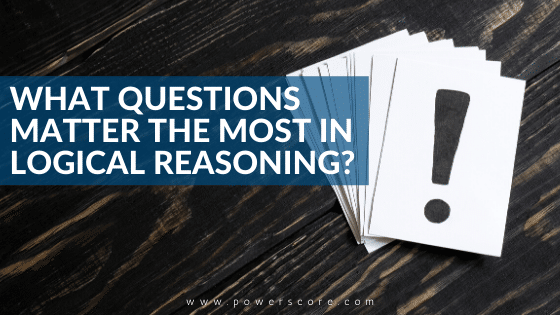In every LSAT class I teach, sooner or later the same inquiry pops up: “What’s the most important type of question in Logical Reasoning?” Students asking this question often remind me of an ER nurse, triaging patients based on the seriousness of their condition. Hopefully, you won’t find yourself in this predicament, having to triage your study of Logical Reasoning. But if you must, here’s some advice:
While it is difficult to say which question types are the “most important” to master, the skills you develop in attacking certain question types are often instrumental in increasing your accuracy on other, related questions. Consequently, the most important LR question types are not the ones that appear most frequently on the exam; rather, it is the ones whose mastery tends to improve your performance on most other LR questions. So, if you are short on time, make sure to focus your attention on the following:
Must Be True
The basis for all Prove-family questions, Must Be True questions are popular in both Logical Reasoning and Reading Comprehension. Approximately 75% of RC questions require you to prove an answer choice by referring to the information contained in the passage. Furthermore, Must Be True questions test and reinforce detail reading, which is critical on the LSAT and in law school.
Flaw in the Reasoning
An extremely frequent question type in recent tests, Flaw in the Reasoning questions test your knowledge of logical fallacies. But they do much more than that. By reinforcing your critical thinking skills, Flaw questions can help you achieve higher accuracy on other question types, such as Weaken and Assumption questions.
Weaken
Weaken questions reinforce your ability to quickly identify logical gaps, which is at the core of many questions in the Help-family (Strengthen, Assumption, Justify). To become a pro in Weaken questions, you absolutely need to understand how to manipulate arguments involving causation. This is inherent in many Strengthen and Assumption questions as well, not by coincidence.
Method of Reasoning
The ability to abstractly describe arguments will improve your performance on Flaw, Parallel, and Method-AP questions, and force you to think about argumentation from a structural point of view. This has the added benefit of helping you on Parallel Reasoning questions as well.
Assumption
Mastering Assumption questions is relatively easy thanks to the tried-and-true Assumption Negation Technique. Furthermore, the ability to spot a variety of assumptions will translate directly into higher accuracy on Weaken and Flaw questions.
Justify
Justify questions were added to the LR section of the test in the 1990s for the sole reason of increasing the overall difficulty of the test. Once you overcome the initial confusion with Assumption questions, solving Justify questions is relatively straightforward using the Justify Formula. Furthermore, training yourself to attack them will invariably improve your understanding of conditional reasoning—a core skill set that is instrumental in Logical Reasoning as well as Logic Games.
Main Point
While somewhat rare, Main Point questions force you to identify conclusions. This is a critical skill in Weaken, Strengthen, Justify, and Assumption questions.
So, there it is: the LR section triaged. One last caveat: we generally like to avoid going to the ER, unless absolutely necessary. The same applies to mastering the LSAT. If you learn how to attack every single question type, you will ultimately conclude that while the questions vary, your overall approach generally stays the same. Our LSAT Logical Reasoning Bible tackles these types of questions–and more–in exhaustive, awesome detail. Check it out here!

